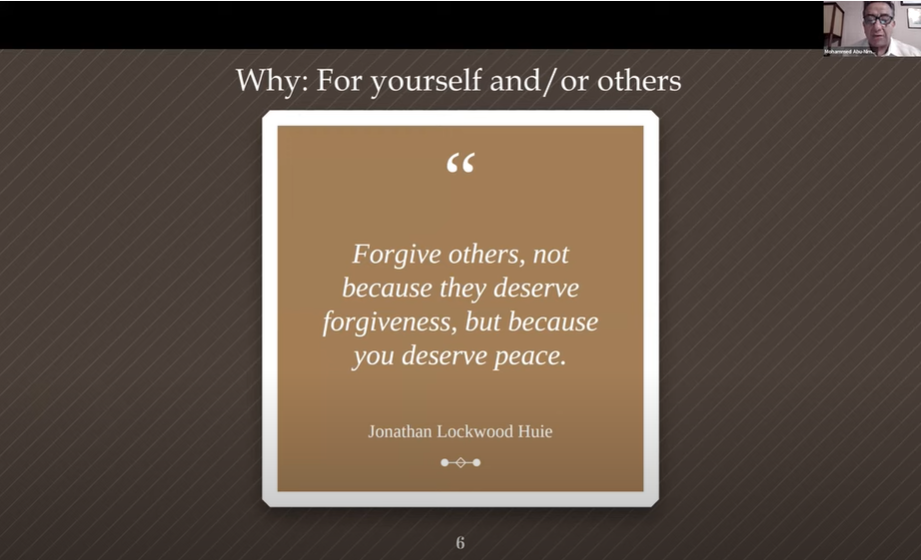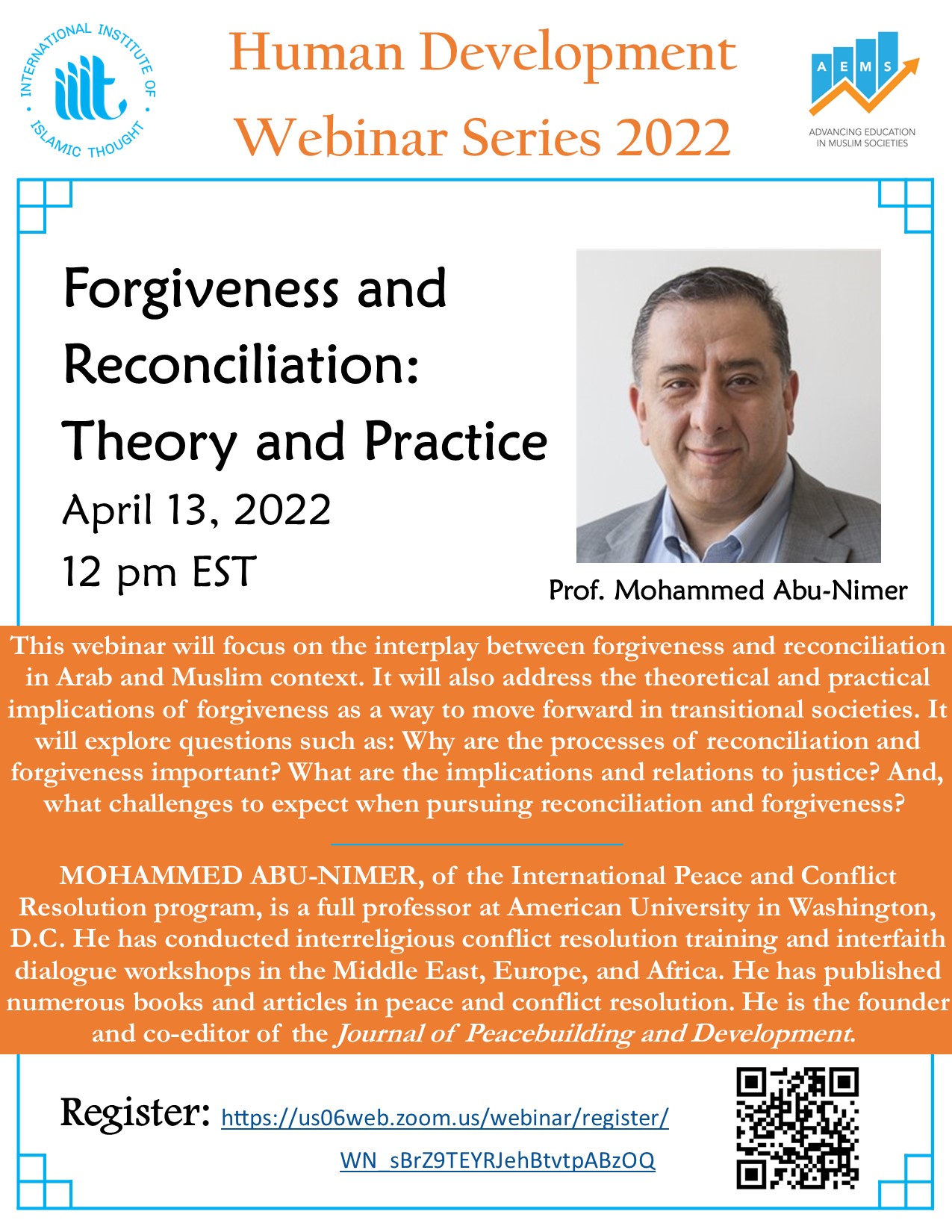Prof. Mohammed Abu-Nimer on Forgiveness and Reconciliation: Theory and Practice
The International Institute of Islamic Thought (IIIT) hosted Professor Mohammed Abu-Nimer on Wednesday, April 13, 2022, for its Human Development webinar series. The title of his talk was, “Forgiveness and Reconciliation: Theory and Practice.” It was moderated by Kareem Makhlouf, Executive Director of the Newlines Institute.
Prof. Abu-Nimer is a professor at American University who has conducted interreligious conflict resolution training and interfaith dialogue workshops in conflict areas around the world, including Egypt, Northern Ireland, the Philippines (Mindanao), Israel, Palestine, Chad, Nigeria, and Sri Lanka. He is also the founder and president of Salam Institute for Peace and Justice, a research-based non-profit organization dedicated to teaching and implementing best practices in peacebuilding and nonviolence.
Prof. Abu-Nimer grounded his presentation in his own empirical research as well as scholarly evidence curated over 35 years. He maintained that contrary to some perceptions, interpersonal and collective forgiveness and reconciliation are similar in nature. He acknowledged that while there are many examples of interpersonal resolutions, there are very few instances of interstate reconciliation. Nonetheless, justice remains at the core of any reconciliation efforts: one must be willing to redefine and reframe their notion of justice in order to reach reconciliation with another person or entity. Prof. Abu-Nimer added that reconciliation, whether collective or individual, is impossible without forgiveness and feeling assured that the injury will not happen again. In the context of the Arab and Muslim world, he cautioned that often politicians hijack terms and concepts and manipulate them, making reconciliation more difficult.
Participants attended the virtual talk from all over the world, including Thailand, Malaysia, Iraq, Palestine, Egypt, Switzerland, Argentina, Nigeria, US, and Canada. The diverse attendees were very engaged during the talk and asked many questions, such as who should initiate reconciliation, how forgiveness and reconciliation can be incorporated into the school curriculum, and whether colonialism is to blame for much of the challenges faced by the Arab and Muslim world. In his responses, Prof. Abu-Nimer emphasized the importance of resolving conflicts closer to the time of injury so that deep-seated animosities do not become institutionalized and normalized. He also underscored the significance of taking responsibility for one’s predicament and seeking collaborative action involving a range of state and nonstate actors in implementing change.
The video recording of the webinar may be viewed here.
About Professor Mohammed Abu-Nimer
Prof. Mohammed Abu-Nimer, of the International Peace and Conflict Resolution program, is a full professor at American University in Washington, D.C., who has conducted interreligious conflict resolution training and interfaith dialogue workshops in conflict areas around the world, including Egypt, Northern Ireland, the Philippines (Mindanao), Israel, Palestine, Chad, Nigeria, and Sri Lanka. As a professor with over 35 years of teaching experience, he has developed numerous courses that deal with different facets of peacebuilding and conflict resolution and regularly publishes on the subject. While his research has focused on a wide array of areas in peacebuilding and conflict resolution, his most recent areas of focus have included faith-based peacebuilding, interfaith dialogue in peacebuilding and building social cohesion, along with pedagogical considerations on incorporating peace and forgiveness education in the Arab world and Muslim world. He also served as a Senior Advisor to the KAICIID Dialogue Centre, an international organization that specialized in interreligious and intercultural dialogue. Abu-Nimer has been both author and an editor of more than 13 books on faith-based and interfaith peacebuilding (e.g. Nonviolence and Peacebuilding in Islamic Context: Bridging Ideals and Reality (2003); Evaluating Interreligious Peacebuilding (2021); Peace-Building By, Between and Beyond Muslims and Evangelical Christians (2009)), as well as interfaith dialogue and its role in peacebuilding and reconciliation (e.g. Unity in Diversity: Interfaith Dialogue in the Middle East (2007)). In addition, he has authored numerous articles in refereed journals, such as the International Review of Education, Journal of International and Comparative Education, Journal of Religious Ethics, Peace and Change: A Journal of Peace Research and the International Journal of Politics, Culture and Society’. In addition to his articles and publications, Dr. Abu-Nimer is the co-founder and co-editor of the Journal of Peacebuilding and Development.

Recommended Posts
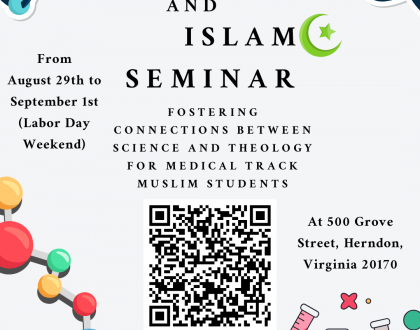
Exploring Bioscience & Islam Seminar Series
May 21, 2025
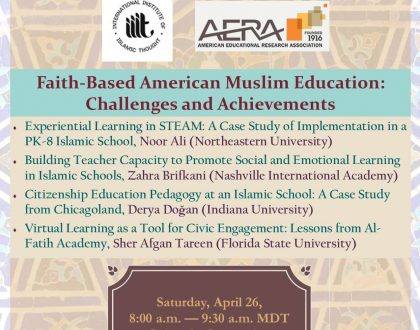
IIIT at AERA 2025 Annual Meeting
April 14, 2025
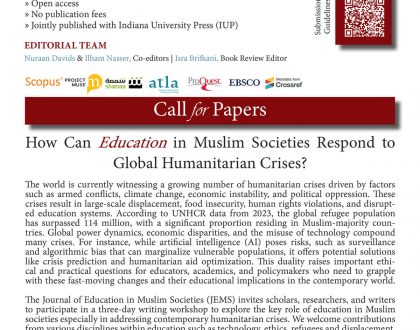
JEMS – Call for papers
April 11, 2025


